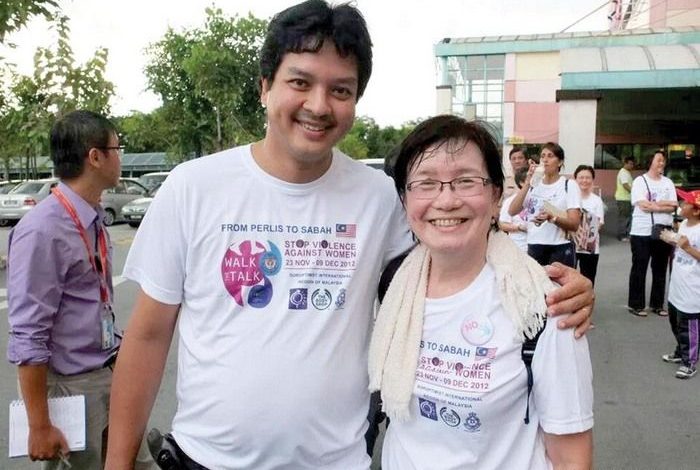A Man’s View


By Mariam Mokhtar
Many women think that events which highlight violence against women, are poorly attended by men. Someone who is experienced in women’s rights issues said, “At talks and walks about women’s’ issues, there is only 10 to 15% male participation and they are mostly our friends, husbands and sons.”
Another NGO expert said, “Men need to be persuaded to join in unless they are from a certain social or community club, like The Rotary Club, whereby they are committed to the club’s mission.”
Just over a year ago, Women, Family and Community Development Minister Rohani Karim told a mainstream newspaper, “The large majority of cases were violence against women. In 2008, out of the total, 2648 cases were violence against women, whereas only 1121 were (violence) against men. Last year, 2558 were against women, compared to 930 against men.”
Her remark about men’s apathy towards attending women’s rights events was most revealing.
She said, “When we organise events on women’s rights that is, say, attended by 300 or 400 people, maybe only 10 participants would be men. In response, we have started to organise women’s rights forums that are targeted at men only. At a recent one, a few hundred showed up. They gave good feedback.” (sic)
On Sunday, December 7, Soroptomist International Ipoh and Perak Women for Women Society (PWW) held a walk and fete at the old Polo Ground, in Ipoh, to increase public awareness of domestic violence; in particular, violence against women. Despite the threat of rain, the event was attended by about 120 people, 30 of whom were men. This is a fantastic response, by men of Ipoh, for this type of event.
Three men, who attended the PWW walk, gave their opinions on domestic violence.
Q: Men’s attendance, at events and walks to promote awareness of domestic violence is generally poor. Why is this? How can we attract more men?
A: J. Rathakrishnan said, “These issues do not take priority in their lives, unless one is directly or indirectly involved in such a situation. Men are very comfortable with themselves and their immediate environment so they deem it a waste of time and energy. They prefer more practical means of solving this issue, such as legislation and not just make noise in public for a few wasted hours, as it does not really create an impact.
“To encourage men to participate, we need to empower the women to make the menfolk play an active role and support them. Women should highlight and alert them to cases where women are being abused and explain that their support, can make a difference in the future. It needs strong woman to push their men to play an active role, and this will have a domino effect.”
Q: From 2010 to 2013, the number of abused men has risen from 21% in 2010, to 25% in 2011 and 27% in 2012. How do you explain this increase?
A: Loheswar said, “Women nowadays have become not only financially independent, and some are more dynamic and enjoy greater success than many men. They are no longer the demure and house-bound girls. Thus their level of tolerance has become thin and they have no qualms about men. It’s all about the money and position.”
Q: Do you know someone who has been abused? What were your thoughts?
A: Caesar Nair (pic) said, “When I was in college, the rented walk-up apartments we were staying in included a married couple renting a unit. Once, returning after classes, I saw the wife sprawled semi-conscious at the bottom of the stairs. There were Ringgit notes all around her. The husband, who had stormed past me, in a rage, a short while earlier, promptly returned and seemed to be helping his wife up, while collecting the notes. She was bleeding slightly from her nose and it was obvious she had been physically abused from her fearful demeanour, in her husband’s presence.
“A few days later I saw them again holding hands, walking like nothing happened. The husband ran a small barber shop in the vicinity where she helped out and I couldn’t help thinking her financial dependency on him left her no choice but to bear the abuse in their relationship.
Such abuse transcends all races and there was no thought about her being from another race, when I tried to help her, before the husband returned.
If such violence can’t evoke a compassionate reaction in us, and we intentionally withhold help, due to our racial prejudices, I believe we have lost a major part of our humanity!”
Studies have found that domestic violence arises from poor communication, money problems, unemployment, substance abuse, and jealousy.
As the global economy worsens, the cases of domestic violence are expected to rise. Abuse can range from constant bullying, constant verbal insults, continual nagging, objects being thrown at the victim, or physical violence, like beatings. If you suffer from domestic violence, or if you know someone who does, please be aware that help, in the form of emotional support and practical information, is available. Speak, in confidence, to a trained expert. The PWW is one such organisation which will welcome you. Their contact details are in the Ipoh Echo, along with a number of other sources of help.


